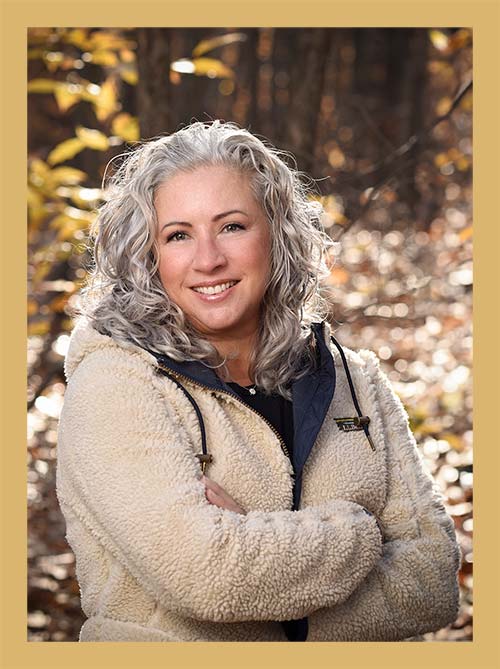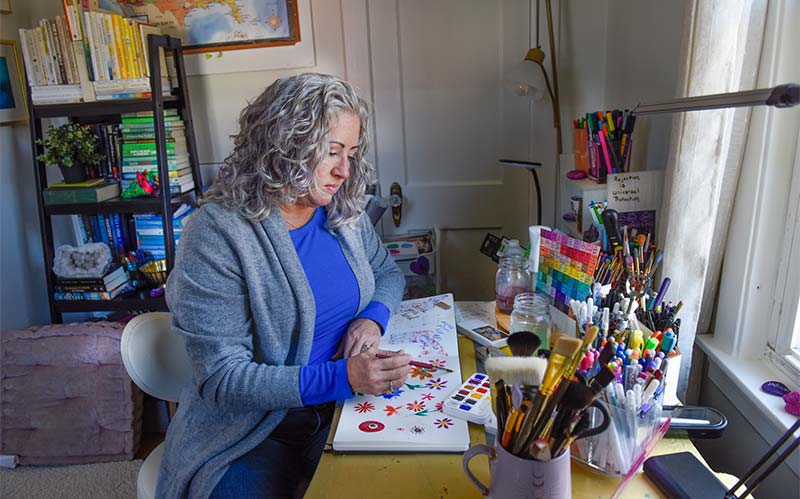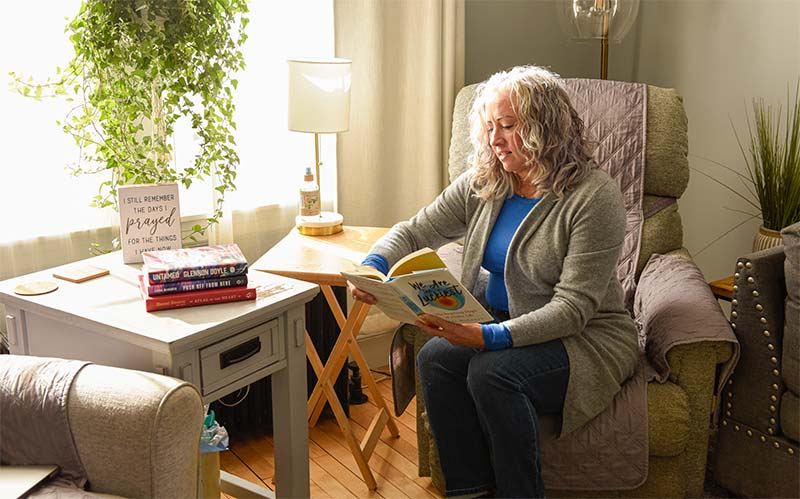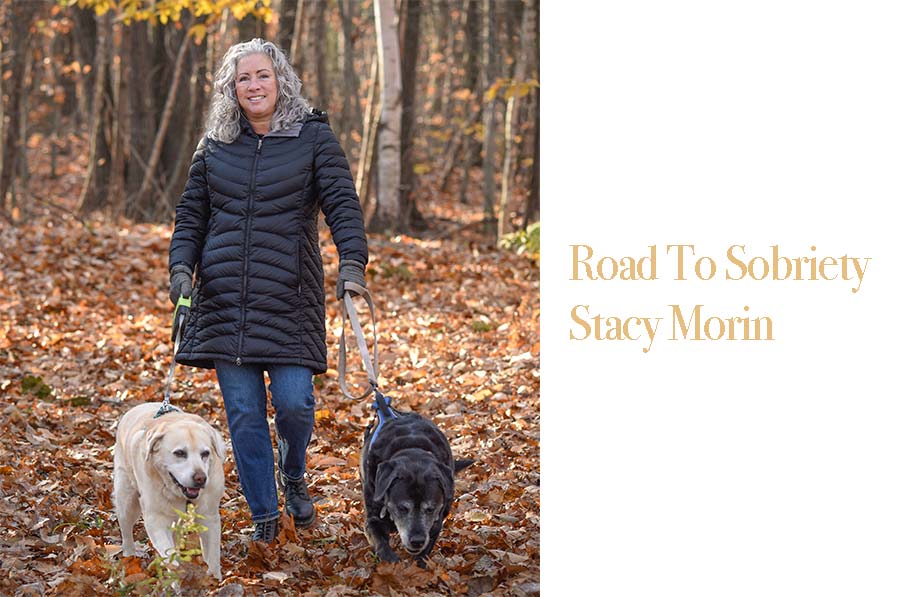by Peggy L. DeBlois | photography by Jose Leiva
Stacy Morin has lived in the Lewiston Auburn community her whole life. She lived her life the way many women in her age group have – being a wife, mother, working, and generally running around always feeling like there was never enough time in the day to get things done. Like most women she knows, she rewarded herself every night with a glass of wine.
Stacy Morin has an alcohol addiction. She’s talking about it.
After a long arduous journey to sobriety, Morin posted her story on Facebook. She figured if she told people what she was doing, the accountability would help her stick with it. That same evening, a complete stranger came up to her in a local restaurant. She told her she had seen Morin’s Facebook post and thought it was awesome.
“Sobriety has been the best thing I’ve ever done,” says Morin. “If I can help one person to stop hating themselves, then it’s worth it.”
Journey to Sobriety
As a child, Morin says she had more trauma in her life than most. Her mother was addicted to alcohol and suffered with mental illness. When her mother was sent to the Augusta Mental Health Institute, Morin was emancipated from her parents by the courts, giving her the ability to make decisions for herself. She was 16.
“In my teen years, when all the kids were experimenting with drinking and smoking, I took right to it,” says Morin. “I thought I was doing normal things, experimenting, going to parties – just normal activities to fit in.”
By the time Morin reached her college years, more trauma in her family led her to drop out before graduation. At 22, she met her husband, who she says is from a “perfect family,” and they were married at 24. Morin believed she had found her happily ever after.
“In hindsight, it was hard,” recalls Morin. “I wanted to fit in to this perfect family, so I became small and didn’t let myself have any hard feelings.”
Morin says she embraced the “Mommy-Wine culture,” which she defines as that upper middle/middle class societal belief that it’s okay for a busy Mom to have wine every night as her reward. She surrounded herself with others who drank like she drank. She was drinking a bottle to a bottle and a half every day, sometimes more. She drank and drove regularly, but gratefully never received a DUI or caused an accident. But she knew it was a problem.
“All my head space was taken up around moderation madness,” says Morin. “I put all these rules on myself, telling myself I’ll measure it out, I’ll only have 5 ounces, I’m not going to drink today. Then I’d find myself going to the store to get more wine.”
Morin says she was in her forties before she considered getting sober. Her kids started asking her why she drank so much. She knew she needed to stop for her health as she got older. She made false deadlines for herself: after the holidays, after this party. There was always another excuse to not stop.
COVID was a blessing
In April of 2021, Morin was diagnosed with COVID and needed to be hospitalized. At the intake appointment, they asked the usual question Morin had been asked regularly at doctor’s appointments: how much do you drink? For once, she finally told the truth. She spent a week in the hospital for both COVID treatment and alcohol withdrawal.
“I really believe this was the universe’s way to wake me up,” says Morin. “The universe gave me COVID as a chance to change, to stop the madness, and I decided I wouldn’t drink anymore.”
The Opposite of Addiction is Connection
Morin had witnessed her own mother go through some stints of sobriety, and she had friends in recovery, so she knew the only way to do it successfully was to have a community.
The obvious choice was AA (Alcoholics Anonymous), which she joined and began the process. For Morin, AA was not the process for her. She did not see herself in the faces of these other local people. Most of the other women were struggling economically, and many were recently incarcerated.
Morin says she started reading Quit-Lit (self-help books on the topic of sobriety) and listening to podcasts and TED Talks with a sobriety focus. Her desire for community was acknowledged in one TED Talk by Yohan Harre, where he coined the phrase “the opposite of addiction is not sobriety, it’s human connection.”
In her search for human connection, she was drawn to the podcast Home, by Lauren McKowen and Holly Whitaker, which takes up the big questions of life through the lens of addiction recovery. She bought both their books: Quit Like a Woman by Whitaker and We Are the Luckiest by McKowen.
“Honestly, Whitaker is a fierce badass, and that scared me,” says Morin. “But McKowen had started The Luckiest Club Zoom meetings, and I saw myself in the faces of these other people. I had tried other communities, but this one felt like these are my people. Since July of 2021, I Zoom into these meetings every day.”
Morin learned that most people stuck in addiction hate themselves and believe they have a moral flaw. The Luckiest Club (TLC) helps people stop spending all their time berating themselves and find new avenues in life to explore.
She has traveled to Chicago, Boston, and Austin for TLC events and is now on a planning committee for Sober in the City in Portland. The early September 2024 event will host over 100 sober women for a weekend of events, speakers, dinner on Peak’s Island, and a photography walk led by Morin.
“My world has opened up, literally,” says Morin.
The Science of Addiction
Morin encourages people to understand the science of addiction. She recommends the book This Naked Mind: Control Alcohol, Find Freedom, Discover Happiness, and Change Your Life, by Annie Grace.

“Sobriety is much more than 12 steps,” says Morin. “True recovery is taking our power back.”
“I couldn’t imagine not being able to drink, as it was so embedded in my life,” says Morin. “I used to feel bad for sober people. But I’ve learned that neural pathways lead you to drink over and over again. It’s just science, not a moral defect.”
Morin believes that getting sober is harder for women. She says society makes drinking look glamorous, and expected, even at children’s birthday parties. Furthermore, women are under extreme pressure.
“We are expected, and we do, juggle all the balls for our family, along with working, taking care of elderly parents – and it’s all supposed to be done perfectly,” says Morin. “It’s no wonder so many women reward themselves with a drink, or another addictive substance, in the evening.”
Encountering Obstacles
For Morin, the hardest part of the day to stay sober is in the early evening. When she first stopped drinking, she leaned into smoking marijuana – acquiring a cross-addiction for two years. She also treated back pain with THC, until she realized it wasn’t really helping the pain.
“THC was just making me lazy and pushing me to eat more sugar,” says Morin. “I finally put it down because I wanted to know what true sobriety felt like.”
Morin admits that sugar has become an addiction for her. She eats “tons” of candy, leading to weight gain, but she tries not to self-judge, and stays focused on not drinking.
Overcoming Obstacles
Morin is at a point in her sober journey where she understands that her drinking was a way for her to “numb out,” to not feel the pressure or emotion. Rather than allow herself to “numb out,” she has chosen to understand her body and its needs. She is incorporating movement into her life by walking, yoga, stretching, breathing exercises, and meditation.


Morin has started exploring things that always interested her, but she was programmed to believe were a waste of her time. For example, she enjoys astrology and all forms of art. She created a space for herself which she calls the Zen Den, where she is surrounded by all the things she loves to look at and create. The walls are covered with art, her own and others, and a colorful mobile of our planetary system hangs from the ceiling. Morin gives herself permission to change her mind about things. One week, she is painting, the next week she is beading, or photographing her walks in the woods with her dog.
“Doing art every day has become one of my greatest tools for staying sober,” admits Morin. “This room is everything the poor 11-year-old girl I was would have loved to have. Sobriety has been like coming back home to myself. As hard as it is sometimes, I never regret it.”
Listening to the Universe
Morin relies on her daily Zoom calls with her TLC group, and she also follows several social media accounts for inspiration. She recommends the hashtags: #sobriety, #recovery, and #alcohol free as tools for getting and staying sober.
“As far as my next move, I’m waiting for the universe to tell me,” says Morin. “I’ve always felt like I need to help and inspire, but I’m not sure how quite yet. Education will certainly be a part of it.”
Morin has considered becoming a sober coach, but feels she is still too early in her own journey and needs more time to heal. She is considering a Facebook group to help others in our community share their experiences, and to share all that she has learned.
“Sobriety is much more than 12 steps,” says Morin. “True recovery is taking our power back.”
Resources for Sobriety
The Luckiest Club (TLC), over 50 online meetings a week, men and women, sub-groups, $22/month membership with scholarships available, www.theluckiestclub.com/
Recovery Elevator, online support, $24/month, www.recoveryelevator.com/cafere/
This Side of Alcohol Facebook group run by Peggi Cooney
Alcoholics Anonymous (AA), meetings throughout the state, free, alcoholicsanonymous.com/aa-meetings/maine/
Books:
Drink: The Intimate Relationship Between Women and Alcohol, Ann Dowsett Johnston
Push Off From Here: Nine Essential Truths to Get You Through Sobriety (And Everything Else), Laura McKowen
Quit Like A Woman: The Radical Choice Not to Drink In a Culture Obsessed With Alcohol, Holly Whitaker
This Naked Mind: Control Alcohol, Find Freedom, Discover Happiness & Change Your Life, Annie Grace
This Side of Alcohol: Random Thoughts and Candid Words of Pain, Hope, Humor, Love – and All That is Possible in Sobriety, Peggi Cooney
We Are the Luckiest: The Surprising Magic of a Sober Life, Laura McKowen
A native of Lewiston, Peggy began writing creatively as a child growing up in a French-Catholic neighborhood. A graduate of Bowdoin College, she began her career in journalism at PC Week in Boston, where she was the ghostwriter for the industry gossip columnist, Spencer the Cat. --
She has also worked locally as an English teacher and public relations consultant. A resident of Auburn, she recently finished her first novel.

